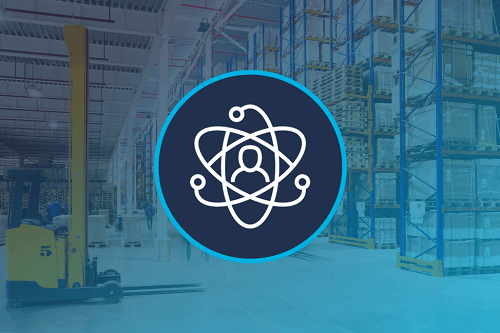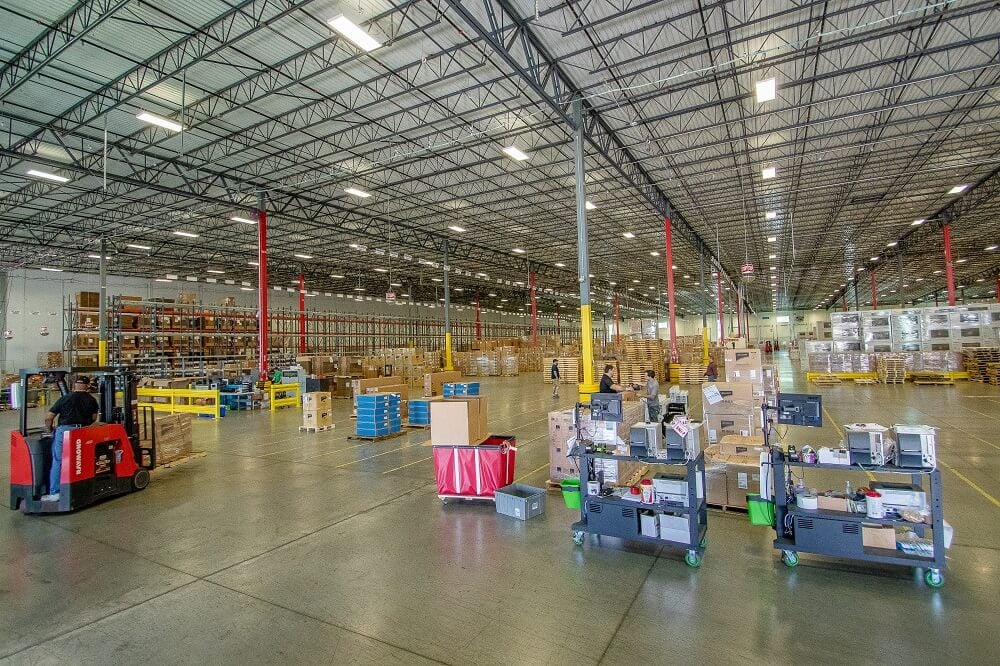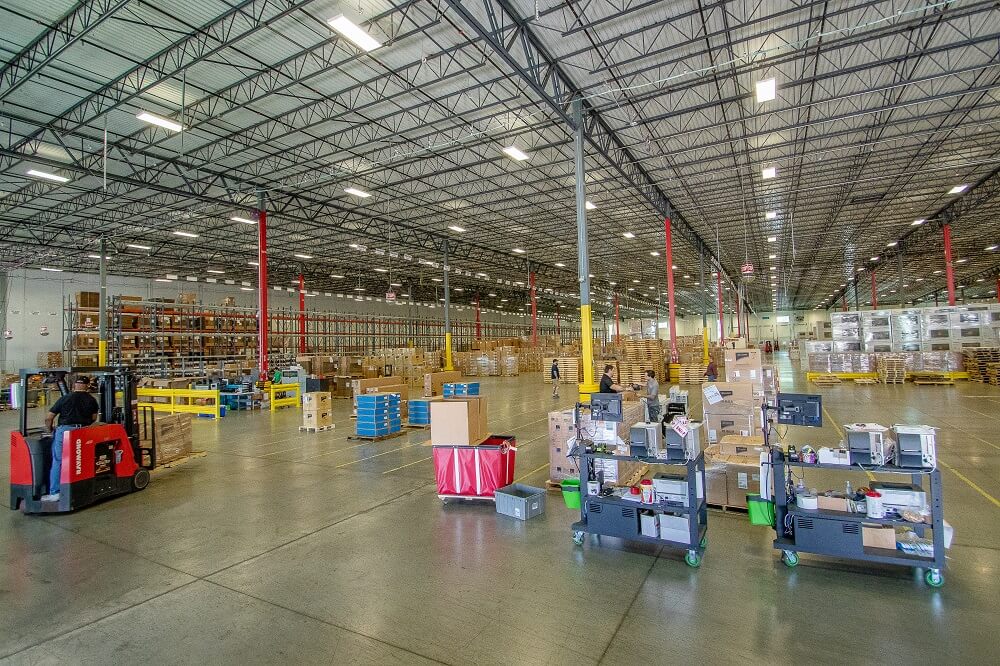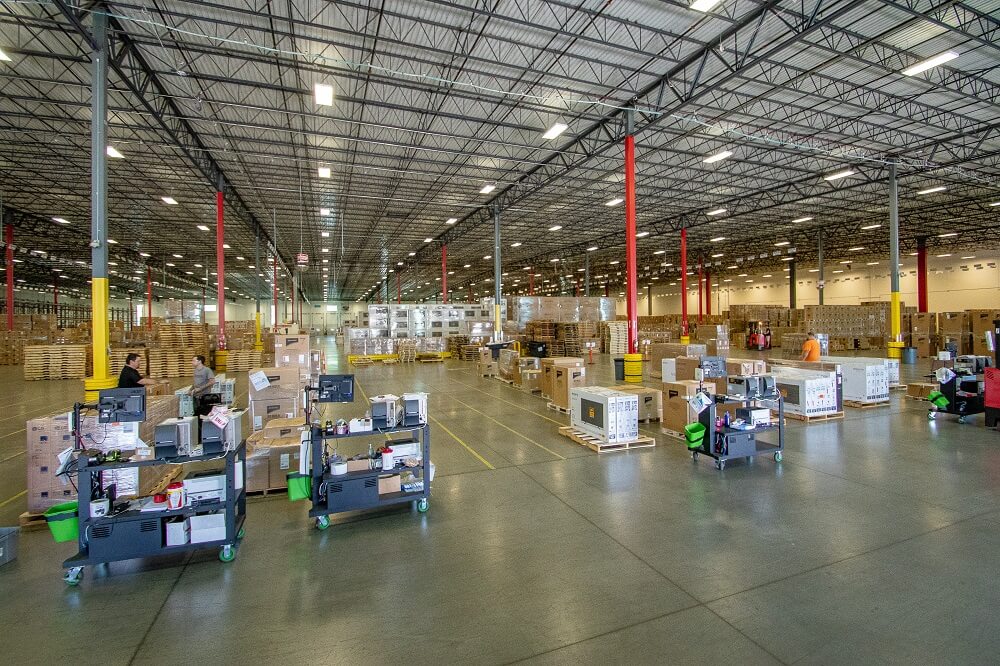What Does a Logistics Manager Do?
A logistics manager is an essential member of an organization’s supply chain, managing the flow of products, services and information for inbound and outbound customers. For technology companies, a logistics manager can optimize and streamline processes for B2B and B2C users, reduce overhead costs and scale with business growth. This highly skilled position and others like it play a pivotal role in the success of your supply chain.
What does a day in their life look like? Learn the importance of logistics management, what the role entails and how to become a logistics manager. Plus, hear from an expert in logistics management about important skill sets and qualities of logistics managers.
1The Importance of Logistics Management
Behind every successful company is a robust supply chain
2What is a Logistics Manager?
A look at the pivotal role of logistics management
3A Day in the Life of a Logistics Manager
Go behind the scenes for a comprehensive view
4How to Become a Logistics Manager
Understand the need for multidisciplinary expertise
Part 1: The Importance of Logistics Management
According to the Bureau of Transportation Statistics, more than 17 billion tons of freight worth trillions of dollars moves each year in the United States alone. Globally, 10.6 billion metric tons of cargo flows annually in the international maritime trade, and some $6 trillion worth of goods travel by air cargo. Behind these statistics of tonnage and value, logistics managers are intimately involved in numerous global supply chain management processes to ensure goods and materials are moved, monitored and managed.
 |
 |
 |
A logistics manager is responsible for all aspects of logistics operations to ensure the right products are in the right place at the right time. They oversee the complex interaction of transportation, warehouse operations, inventory management, import and export processes, purchasing, production planning and customer service. From small businesses to multinational enterprises to nonprofits and government agencies, all types of organizations require logistics management. A logistics manager plays a vital role in an organization’s financial performance by impacting inventory positions and significant cost areas and ensuring the company can deliver the service its customers expect.
Successful logistics management requires a blend of technical and interpersonal skills, as professionals in this role coordinate with internal and external customers and direct the efforts of teams of specialists and staff to provide a high level of service. Additionally, they must continue to identify areas for efficiency improvements.
Drive efficiencies with a purpose-built global logistics solution that includes flexible supply chain models specially designed to meet your business needs and enable your products to flow seamlessly to your customers
Maintain customer loyalty, reduce costs and keep your customers functioning at optimal levels through a scalable, global logistics and repair solution that encompasses agile, OEM-approved depot repair services
Part 2: What is a Logistics Manager?
A logistics manager is responsible for many aspects of a company’s supply chain processes. Primary duties include:
- Distributing and storing inventory and supplies
- Setting and reviewing budgets
- Processing shipments
- Building and scheduling inbound and outbound orders
The job title may vary by organization or specific responsibilities, but the basic functions are similar.
The logistics function touches all aspects of an organization, from sales and marketing to business administration and customer service to product design and procurement. Because logistics is central to the organization, the logistics manager function is crucial to supporting global business operations in the connected economy.
A logistics manager salary varies by employer, experience and location. In the US, the median wage for a logistics manager salary is $50.76 per hour or $105,580 per year, according to the Bureau of Labor Statistics (BLS). Overall, a logistics manager salary ranges from $58,570 to $162,770 annually. Those with graduate degrees and industry certifications typically earn a higher wage. A logistics manager salary also typically includes profit-sharing, bonuses and other forms of compensation. The BLS forecasts the demand for logistics managers will be about average for all jobs through 2030, with a growth potential of up to 10% in additional positions.
Logistics managers are in demand as many original equipment manufacturers (OEMs) in the technology industry transition to the everything-as-a-service (XaaS) model. As these companies embark on a significant digital transformation in the way they do business, logistics plays a vital role in balancing traditional product delivery with new lines of service revenue streams and delivering uniform customer engagement regardless of geographical location.
For companies considering global expansion and new service models, it’s critical to have a logistics manager who understands the internal processes and cultural differences for new service areas to integrate the company’s operations with local conditions. Operational experience and flexibility will help ensure your digital transformation strategy is supported by an efficient logistics network.


Logistics is always evolving and always changing, so if you enjoy working in that kind of environment, this is a fantastic field to get into."
Part 3: A Day in the Life of a Logistics Manager
Logistics management isn’t just about managing activities on the warehouse floor; it may also include project management, recruitment and training, customer service and technology management.
On a typical day, a logistics manager has a detailed plan with production goals to accomplish. But each day also presents challenges and opportunities to excel in adaptability and responsiveness, from customer service requests to inclement weather delays that could hinder warehouse and transportation operations.
In today’s logistics industry, information management is just as important as the flow of products. A warehouse serving multiple customers may employ various inventory and warehouse management processes for inbound and outbound shipments to meet the different requirements of each customer. Additionally, logistics managers may oversee international shipments and solve customs issues in numerous jurisdictions.
While a logistics manager engages with daily operations, they are also involved in long-term strategic planning and project management. No matter how long a warehouse has been in operation, logistics managers continually look for ways to improve efficiency and reduce environmental impact. Today’s logistics managers are often responsible for researching and implementing technology to reduce the carbon footprint of operations, such as switching to LED lighting and rethinking their transportation networks to consolidate shipments. 
Another way logistics managers work to reduce their carbon footprint is by increasing the number of operations within the existing building footprint to avoid the need for additional space. Part of this responsibility includes improving operational efficiency and reducing expenses even amid rising costs for energy, labor, transportation and other critical supplies.
Each day is an opportunity to deliver on customer service promises and develop a strategy for continuous improvements that enables logistics managers to significantly impact their organizations.
Meet an Expert in Logistics Management
Hear from Steven Reigle, Senior Manager of Production Management for Shyft Global Services, about what it takes to manage a complex logistics operation on behalf of multiple customers.


 [As a logistics manager], you can make instant impacts in operations and in people's lives, because people around you feel that success also."
[As a logistics manager], you can make instant impacts in operations and in people's lives, because people around you feel that success also."
Part 4: How to Become a Logistics Manager
There are different paths to becoming a logistics manager. Some prospects take advantage of formal logistics education while others may work up the ranks based on their skills and experience. Some logistics managers even transition from adjacent career paths such as engineering or finance.
 Understand the Role of a Logistics Manager
Understand the Role of a Logistics Manager
While some technical and industry knowledge is necessary, successful logistics managers are adaptable and flexible. Each day presents new challenges, and those who prefer to work according to a consistent routine could find it hard to adapt. A logistics manager is often a coach and mentor who leads groups of workers to follow procedures — and adapt them as needed — to meet high standards for speed and accuracy.
 Enroll in Technology and Certification Classes
Enroll in Technology and Certification Classes
Technology is the backbone of global logistics, so it’s critical to be proficient in multiple systems. Certifications are available for many of the top IT solutions providers. Logistics organizations offer certification and accreditation programs that prepare managers for success and reflect their commitment to the profession. On-the-job training, mentoring opportunities and certification and accreditation classes means a manager without an educational degree in logistics can still prepare themselves for success in logistics management.
 Embrace On-the-Job Training and Mentoring
Embrace On-the-Job Training and Mentoring
Logistics managers learn by doing, so take advantage of opportunities for formal and informal learning and training on the floor. Learning each job in a warehouse allows you to better understand the challenges and targets for improvement as well as see the whole-picture view of logistics operations.
 Develop Personal and Leadership Skills
Develop Personal and Leadership Skills
Logistics managers manage diverse groups of people, from fellow managers to warehouse workers. A logistics manager may need to help employees focus on their tasks with a high degree of engagement and help lead project teams in designing and implementing operational improvements. In a fast-paced logistics environment, leadership is a critical element for success.
 Seek Logistics Education and Training
Seek Logistics Education and Training
Many universities offer undergraduate- and graduate-level logistics courses that combine operational, managerial and financial learning to prepare for the multidisciplinary logistics role. Some professional associations and other organizations offer specialized logistics management training courses that could prove useful in pursuit of a formal education.








